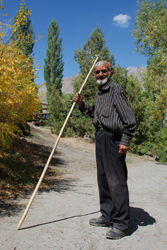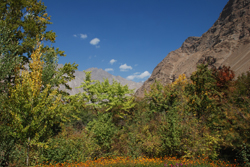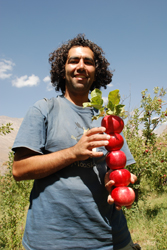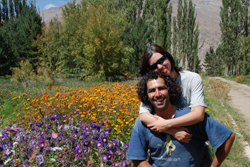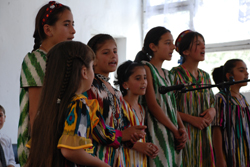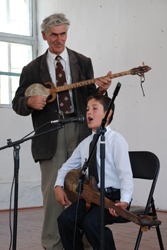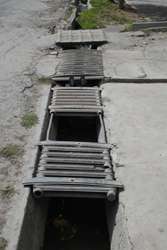Khorog: Apples and Flowers
14 September, 2008, 02:34 am in "Tajikistan"
Khorog mostly closes down on Sundays. So, we took a minibus to the Botanical Garden, the second highest in the world. The garden is up a hill beyond a gate. Inside, there was a hillside covered with different trees. We walked a little down the road and Rowshan picked some apples. Then a gardener saw us and told us to go down the paved road. He was speaking in Russian. Rowshan spoke to him in Farsi but he continued answering in Russian. "Tell him you don't speak Russian." I said. Rowshan informed him of this and asked him to speak Tajik. The man asked, "Where are you from?" Rowshan replied, "Iran." "Then why aren't you speaking Farsi?!" the man asked. "I AM!!!" Rowshan replied. Once the man established Rowshan was indeed speaking Farsi, he switched to Tajik and enthusiastically told Rowshan which path we should follow and where the flower gardens were.
We followed the street. There were lots of different trees, some with labels but most just growing in chaotic groves. The mountains surrounding the park were dry and brown but the garden was full of life. As we were walking we came upon a group of guys with hand-fulls of apples. One guy had pears sticking out of every pocket. They recommended cutting across a grassy avenue to get straight to the apple orchards.
Beyond was an area full of different apple trees. Most of them full of bright red apples. Some had boughs which were about to break from the weight. We sampled different apples. Another group of men walked by. One told us the apples in this area weren't sweet. However, we thought they tasted pretty good. We took another path next to rose bushes, some with just rose-hips remaining, which led to an avenue with flower beds. Many were common garden varieties: marigolds, zinnias, bachelor buttons, but their unlikely location in such a dry brown area seemed almost magical. The air was filled with their fragrance.
As we got to the end of the path, it intercepted another road and we ran into the men we'd seen in the apple orchard. The one who had mentioned the sweet apples produced 2 which he presented to us. They were very sweet. This path overlooked the river valley and the town. The river wound below us like a jade serpent. The town was full of tall green trees. In the lower parts of the hills were occasional patches of green, denoting someone's field, a house and yard. We couldn't spend as long as we wanted in the garden because we were trying to make it to a concert at 2 in town.
We found the school where the concert was. There were rows of chairs set up in the auditorium and lots of kids. At the door, a young European woman said “Hi”. A little later she came up to us and explained the music group was part of a program of the organization “Xirad” which means “enlightenment.” It was started before the Civil War (1996) with the goal of giving children activities to keep them out of trouble. They also had Tae Kuan Do classes. She was from Switzerland and played the clarinet. There was another European woman involved from Germany. They came for a 3-4 month project where they worked with the kids and organized a set of concerts.
We found the school where the concert was. There were rows of chairs set up in the auditorium and lots of kids. At the door, a young European woman said “Hi”. A little later she came up to us and explained the music group was part of a program of the organization “Xirad” which means “enlightenment.” It was started before the Civil War (1996) with the goal of giving children activities to keep them out of trouble. They also had Tae Kuan Do classes. She was from Switzerland and played the clarinet. There was another European woman involved from Germany. They came for a 3-4 month project where they worked with the kids and organized a set of concerts.
The repertoire was a combination of English rap, Tajik songs and songs in English and other languages. There was no shortage of enthusiasm and the kids in the audience went wild-- clapping, singing along, and sometimes dancing. One girl did a beautiful Pamir dance and another girl sang a Tajik song like a professional. They were also accompanied by a rabab player. For one song, one of the boys joined him playing a rabab and singing. A couple boys played drums. It was great to see how both the audience and performers enjoyed the blend of traditional and modern music.
One of the odd things we've noticed about the Pamirs is use of old metal radiators for bridges and other things they were not meant to be. I found this a practical way of recycling objectss that are otherwise just useless remnants of Soviet times. When I was living in Russia, I had a radiator that most of the time didn't work. I think I remember maybe once or twice being overcome with surprise at feeling some heat come out of it. I like to imagine someone getting pissed off, ripping the useless piece of metal out of the wall and throwing it out the window where it lands fitting perfectly over one of the street's wide deep gutters. “Hey, that's a good idea!” someone says as they are able to comfortably cross the gutter. Soon everyone is ripping their useless radiators and creating bridges and walls from them.
Comments
- Comments
Powered by My Blog 1.69. Copyright 2003-2006 FuzzyMonkey.net.
Created by the scripting wizards at FuzzyMonkey.net..
(Code modified by Rowshan Dowlatabadi)
Created by the scripting wizards at FuzzyMonkey.net..
(Code modified by Rowshan Dowlatabadi)



